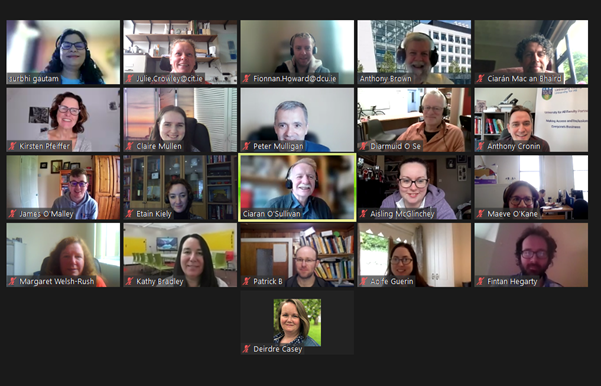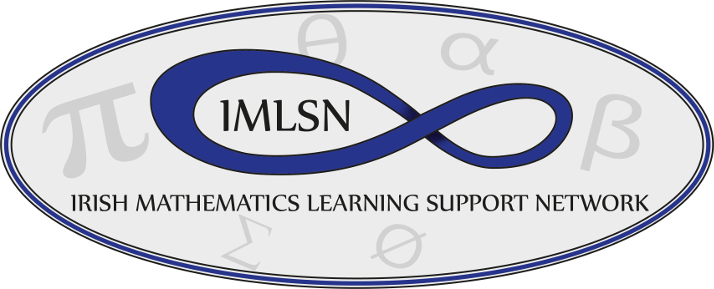“Mathematics Learning Support – Linking Practice to Research in the New Normal”
A report on the Irish Mathematics Learning Support Network (IMLSN) Workshop 2022
The 13th annual IMLSN workshop took place online via Zoom on Monday the 13th of June 2022. There were 26 participants from 14 Irish Higher Education Institutions in attendance at the workshop. IMLSN would like to sincerely thank all those who contributed to this meeting – the organisers Ciarán O’Sullivan and Julie Crowley as well as all participants, facilitators and moderators of breakout rooms.
The chair of the IMLSN, Kirsten Pfeiffer, opened the event by emphasizing the importance of opportunities like this workshop for the community to get together and share their ideas, challenges and experiences. Attendees were invited and encouraged to get involved with the IMLSN.
The aim of the event was to look forward and envisage what Maths Support might look like in the years ahead. How can we capitalise on our most recent experiences during Covid-times and take what we have learned to develop Maths support for our students? What other areas of opportunity for research do we see for Maths support in Ireland? This workshop provided an opportunity to bring together researchers, tutors and coordinators of Maths support from around the country to discuss these questions.
The workshop consisted of two 15-minute talks and five 5-minute lightening talks on practice and/or research in progress as well as more fully formed research. This talks session was followed by small group discussions in breakout rooms. The proposed themes for these discussions were
- Hybrid maths support / New normal,
- Engaging non-engagers,
- Tutor development,
- Re-usable resources.
The workshop finished with a whole group discussion to get an overview about what has been discussed in the themed discussions and then to focus on what IMSLN can do to help its members achieve the research goals just discussed.
Talks Session
Patrick Browne (Technological University of the Shannon) - ‘Reflections on using the WebWorK platform for mathematics’
The first 15-minutes talk opened with an introduction and considerations about the WebWorK online assessment tool for the teaching of mathematics to engineering students. The speaker then suggested a unique approach to getting insights into students’ habits and behaviour when using the WebWorK system, namely investigating log files in a server. These present a wealth of data that is not usually visible to the instructor. Some early results of this data analysis were presented to exemplify the advantage and practicality of this approach.
The slides from Patrick Browne's talk can be downloaded here.
Anthony Brown (University College Dublin) - ‘Supporting students with a weak mathematical background during their first trimester of university study using Numbas’
This 15-minutes talk first described an initiative where the online assessment system Numbas was used to support students taking two Level 0 courses at UCD. These courses were offered to undergraduate students whose mathematics results from their school leaving certificate was weak. The assessment consisted of weekly class tests through Numbas and a ‘traditional’ final exam. The speaker reported on a study to investigate how students’ grades of both types of assessment relate to each other. The findings showed a clear correlation: students’ engagement with the Numbas exams which counted towards the final grade could be compared with the engagement with the same exams which could be taken at any time by the students for revision purposes.
The slides from Anthony Brown's talk can be downloaded here.
Fionnán Howard (Dublin City University) - ‘DCU Online support – current and future’
This lightening talk described the current online support being offered by the maths learning centre in DCU and outlined what can be provided in future. With students having returned to in-person learning, the role of online support may change, but is expected to be desirable for certain students. Using attendance data from 2021-22 to inform the decision, the speaker presented their proposed online supports for next year.
The slides from Fionnán Howard's talk can be downloaded here.
Claire Mullen (University College Dublin) - ‘MathsFit: increasing first-year students' engagement with maths support’
This lightening talk focused on preliminary findings from the ongoing project known as MathsFit, a suite of online and in-person mathematics supports designed for in-coming first-year students of service courses at University College Dublin. MathsFit aims to increase engagement with support especially among students identified as ‘at-risk’ through the MathsFit proficiency quiz. The speaker described the rationale of the project, some engagement metrics, and presented results from the first year of the programme. Early results indicate that MathsFit does improve student engagement with the mathematics support services available.
The slides from Claire Mullen's talk can be downloaded here.
Ciarán Mac an Bhaird (Maynooth University) - ‘The Sigma Accessibility Special Interest Group (SIG)’
This lightening talk provided a brief overview of the work of this SIG to-date, including a survey paper, and the development of resources for mature students and for students with dyslexia, dyspraxia will be provided. These resources are for use in an MSC setting. The speaker outlined current plans for moving the SIG forward, in particular, seeking more people to get involved and splitting the focus between digital accessibility and cognitive disorders or sensory impairments.
The slides from Ciarán Mac an Bhaird's talk can be downloaded here.
Kirsten Pfeiffer (National University of Ireland, Galway) - ‘The IMLSN Resource Website Project’
This lightening talk first described recent developments of the IMLSN Resources Website. The speaker then reported about an ongoing study which aims to get insights about students’ and instructors’ habits and challenges with online mathematics and statistics resources. The plan is to use findings from this study for further advancement of the resources website. This is an ongoing project, and the group is looking for more participants to get involved.
The slides from Kirsten Pfeiffer's talk can be downloaded here.
Surbhi Gautam (Atlantic Technological University - GMIT) - ‘Using Desmos to enhance student learning in Mathematics’
This lightening talk outlined the potential for the use of Desmos to enhance student engagement and understanding. Desmos is a free graphing and teaching tool for mathematics. Teachers can use prebuilt activities or can create activities themselves at [teacher.desmos.com]. The speaker provided interesting and novel example activities and used these to exemplify that students will learn by interacting with mathematical representations, illustrations of the world, and their classmates.
The slides from Surbhi Gautam's talk can be downloaded here.
Group Discussion Session
Themed small group discussions in breakout rooms were held that then followed by a whole group discussion to get an overview for the themed discussions and then to focus on what can IMSLN do to help its members deal with any issues that emerged.
Theme 1: ‘Hybrid maths support/new normal' Moderator: Anthony Brown
The group started by discussing the various approaches that we took during the first phase of the pandemic. These included drop-in online sessions, online sessions using an appointment system, group online sessions, and support using a VLE forum.
The group then went on to talk about the advantages and disadvantages of these different sorts of support, but the only real problem we found was lack of engagement, and this applied to all the different types of support. No one had found a solution for this, but it was mentioned that mature students seemed to be more accepting of online support.
Looking forward, a real worry is that the lack of engagement carried through to face-to-face support when that was re-introduced, especially for first year students. It was suggested that due to the disruption, this cohort of students seems to be quite isolated and less willing to accept support. Most were not sure exactly what support they were going to offer next year, but there was a real eagerness to get some ideas to deal with this lack of engagement.
Theme 2: 'Engaging non-engagers' Moderator: Claire Mullen
Participants compared their experiences with non-engagement particularly in the recent COVID-19 years. Issues were raised around students' mental health, financial pressures, and social interactions based on anecdotal knowledge and current learning analytics research. The need for a holistic and ethical approach to how to engage with students deemed 'at risk' was discussed. In particular, the view that not all students wish to engage. Strategies to engage the non-engagers were desired especially as engagement seems to have decreased since the onset of the pandemic.
Theme 3: ‘Tutor development’ Moderator: Peter Mulligan
Due to increased workload during COVID-19, it was recognised that finding time for ongoing tutor training was difficult. Hope was expressed that more substantive training could be re-introduced this coming academic year. All members of the room highlighted the importance of quality tutor training and in this regard, the Tutor Competency digital badges seems to tick a lot of boxes. Content templates are available on the IMLSN website which are fully customisable. The four badges were trialled at Maynooth University and NUI Galway. Feedback from the tutors that participated was extremely positive. In particular, the tutors appreciated the formal recognition that the badges provided for the training they received. It was suggested that if an institution were to run the badges in the coming year, they should consider inviting tutors from other colleges to attend. It was mentioned that completing two badges per semester is comfortable for most tutors.
Whole Group Summary Discussion
The workshop finished with a whole group discussion to get an overview for the themed discussions. During this whole discussion engaging non-engagers emerged as the key challenge. The issue of engaging disaffected learners was identified as a key problem in the last academic year for many institutions. Plans were discussed to have an IMLSN event focussing on how institutions intend to address this in the coming year in early September.
Plans to promote the IMLSN Tutor Competency digital badges in as many institutions as possible in the coming academic year also emerged as a shared objective for some members of the network.
Insights from Feedback Forms
In feedback forms for the workshop participants appreciated the format of the breakout rooms and highlighted the opportunity to meet people and get a sense of how things are going for them in their institution. While enjoying all of the talks, the feedback indicated that participants were very positive about the five-minute lightning talks which allowed for a lot of information to be shared in a short space of time with the possibility for follow up with the person/topic if someone was really interested.
In terms of key takeaways/learning from the workshop the importance of collaboration across institutions was mentioned. The shared challenge of engaging students with mathematics and supports both in person and online was very prevalent in the comments. In terms of potential follow-on events the feedback strongly indicated a preference for more workshop opportunities on addressing engagement in the coming year.
The event was followed by the IMLSN AGM.

Some of the participants at the Annual Irish Mathematics Learning Support Network (IMLSN) Workshop 2022

